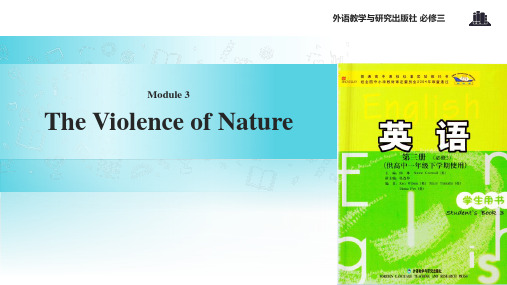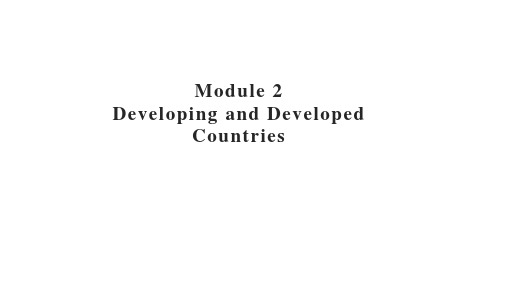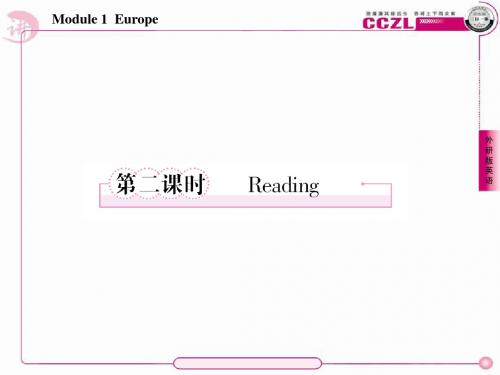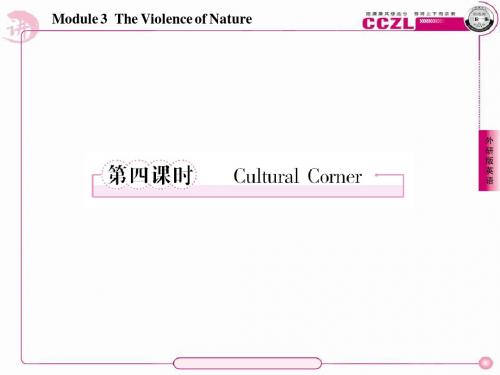英语:M2 课件(外研版必修3)
合集下载
高中英语外研版必修3【教学课件】Module 3

Galveston
外语教学与研究出版社 必修三
1
Read about the Gulf Stream and check the meaning of the words :
1, What is a current ? (a) A kind of electricity ★ (b) A movement of water (c) A kind of wind 2, What kind of things flow ? (a) Water (b) Time ★ (c) Money 3, If two places are on the same latitude ,they are on the same line _____ (a) east/west ★ (b) north/south
3. How many tornadoes are there in the US every year?
4. How many people died in the worst tornado of all time ?
外语教学与研究出版社 必修三
1. How strong are tornado winds? More than 400 Km/h. 2. What can happen to furniture when a house is destroyed by a tornado?
It stays where it was. 3. How many tornadoes are there in the US every year?
About 800. 4. How many people died in the worst tornado of all time ? More than 700.
外研版高中英语必修3课件:Module2 Developing and Developed

Ⅱ.Fill in the blanks according to the passage.
The top five countries in the list are:1. Norway ,Iceland, Sweden, Australia, the Netherlands, while the US is at number 7. The Human The UK is in the thirteenth position, while Development China is in the 2. middle of the list. Index The bottom ten countries are all 3. African countries, with Sierra Leone at the bottom of the list.
The third step was to protect mothers and young children from food shortages. The experts said mothers and young children suffered the most from hunger. Many lives could be saved by making sure that they were the first to get help.
1.How much do you know about developing and developed countries? Is China a developed country?
2. What methods do the experts suggest to reduce hunger? Read the following passage to find the answer.
外研版高中英语必修三 Module 2 全单元课件 (共111张PPT)

Module 2 Developing and Developed Countries
Period 1 Introduction & Reading
Pre-reading
Do you know the places?
North America
Arctic
Europe Asia
Atlantic Indian Africa Ocean
education _________
poverty _________
disease _________
4. when you do not have food, especially for a long period of time
hunger _______
5. the money that you make
Discussion
Which countries are developed countries and which are developing ones?
Developing countries are most of countries in Asia, Africa and Latin America.
Continent North America
Country
the US
Japan France, Germany, Norway,
Asia Europe
Sweden, the Netherlands,
the UK, Iceland Oceania
Australia
Match the words with the definitions.
South America Antarctica
Period 1 Introduction & Reading
Pre-reading
Do you know the places?
North America
Arctic
Europe Asia
Atlantic Indian Africa Ocean
education _________
poverty _________
disease _________
4. when you do not have food, especially for a long period of time
hunger _______
5. the money that you make
Discussion
Which countries are developed countries and which are developing ones?
Developing countries are most of countries in Asia, Africa and Latin America.
Continent North America
Country
the US
Japan France, Germany, Norway,
Asia Europe
Sweden, the Netherlands,
the UK, Iceland Oceania
Australia
Match the words with the definitions.
South America Antarctica
高一英语必修3(外研版)课件2-4Cultural Corner

(2)(2010·湖北·30) It is illegal for a public official to
ask people for gifts or money ________ favors to them. A. in preference to C. in agreement with B. in place of D. in exchange for
1)v. 共用;分摊;共有 I share a flat with four other people. 我和其他4人共住一个公寓。 2)v. 分享;均分 Let's share the pizza between the two of us. 我们俩分了这张意大利饼吧。 3)v. 分诉;分担
外 研 版 英 语
外 研 版 英 语
Module 2 Developing and developed countries
外 研 版 英 语
Module 2 Developing and developed countries
1.close to
接近“几乎”;既可表示地点、时间的接近,也可表 示程度上的接近。 The children were warned not to be close to the fire. 人们警告孩子们不要靠近火。 His house is close to school. 他家靠近学校。
5)n. 股;股份
知识拓展 share sth. with sb. 与某人分享某物 share sth. between/among... „„平分某物
外 研 版 英 语
Module 2 Developing and developed countries
即学即用
高一英语必修3(外研版)课件1-2Reading

外 研 版 英 语
Module 1 Europe
词语辨析
symbol, mark, sign 1)symbol符号、记号或象征,尤其指用有形实物代抽 象的实体。 2)mark标记、斑点、痕迹、商标、分数、标准、刻度、 记号,为某一特定目的而做的标记或有意、无意留下的痕 迹。 3)sign符号、招牌、征兆、记号、手势,代表有固定
外 研 版 英 语
Module 1 Europe
知识拓展
project /prədekt/ v. 投射,发射 The slide was projected on the screen. 幻灯片被投射在银幕上。 即学即用 完成句子 The year. housing development will go ahead next
外 研 版 英 语
the elderly老年人
Module 1 Europe
即学即用
用ancient, old或aged填空 ①There are many________buildings in Rome while there are many modern ones in New York. ②The________man with an________hat is a professor from Beijing University. ③The girl________fifteen saved a boy seven years________.
2.locate
1)vt. ①确定„„的位置;探明;找到 Locate the remains of a sunken ship. 发现沉船残骸。 ②把„„设置(在);使„„坐落于„„(常用被动) The restaurant is located near the museum. 那家饭店开设在博物馆附近。
Module 1 Europe
词语辨析
symbol, mark, sign 1)symbol符号、记号或象征,尤其指用有形实物代抽 象的实体。 2)mark标记、斑点、痕迹、商标、分数、标准、刻度、 记号,为某一特定目的而做的标记或有意、无意留下的痕 迹。 3)sign符号、招牌、征兆、记号、手势,代表有固定
外 研 版 英 语
Module 1 Europe
知识拓展
project /prədekt/ v. 投射,发射 The slide was projected on the screen. 幻灯片被投射在银幕上。 即学即用 完成句子 The year. housing development will go ahead next
外 研 版 英 语
the elderly老年人
Module 1 Europe
即学即用
用ancient, old或aged填空 ①There are many________buildings in Rome while there are many modern ones in New York. ②The________man with an________hat is a professor from Beijing University. ③The girl________fifteen saved a boy seven years________.
2.locate
1)vt. ①确定„„的位置;探明;找到 Locate the remains of a sunken ship. 发现沉船残骸。 ②把„„设置(在);使„„坐落于„„(常用被动) The restaurant is located near the museum. 那家饭店开设在博物馆附近。
外研版英语必修3-2单元课件共21页PPT资料

hold a position
拥有一个职位
The runners got into position on the starting line.
赛跑运动员已进入起跑线上的位置。
The orchestra were all in position, waiting for the conductor.管弦乐队队员 都已各就各位,等待着指挥的到来。
我花了好几个小时才算出那些代数题。
第14讲 │ 单词点睛
• 4 crowded adj. 拥挤的
(1) crowd n. 人群;群众
v. 挤满, 塞满;使……拥挤
(2) crowds of/a crowd of 许多
be crowdedw_i_th__
crowd into
挤满…… 大批涌入
5. exchange n.& vt.交换
第14讲 │ 单词点睛
单词点睛
1 measure v. 测量;衡量, 判定;(长、宽、高等)是n. 尺
寸;措施
adopt/take measures to do
采取措施做某事
make…to one’s own measure
依照某人的尺寸
做……
【易错警示】
measure表示“(长、宽、高等)是”时是系动词, 没有被动语
• 6.similarity n. 类似→ __s_im__il_a_r _ adj. 类似的→ _s_im__il_a_rl_y_ adv. 类似地
• 7. _c_r_o_w_d_e_d_ adj. 拥挤的→crowd v. & n. 拥挤;人群,
群众
• 8. __u_n_fo_r_tu_n_a_t_e_ adj. 不幸的, 可惜的→fortunate adj. 幸运的→ _u_n_f_o_r_tu_n_a_t_el_y_ adv. 不幸地;可惜地→ _f_o_r_tu_n_e__ n. 运气, 财富
高一英语必修3(外研版)课件3-4Cultural Corner

知识拓展
be active in... 在„„方面活跃/积极 take an active part in 积极参加 actively adv. 积极地;活跃地 activist n. 积极分子 activity n. 活动
外 研 版 英 语
Module 3 The Violence of Nature
外 研 版 英 语
解析:考察in的词组。 in all “共计”; in fact“实际 上”; in short “简而言之”; in return “作为回报”。 答案:D
Module 3 The Violence of Nature
即学即用
—Do you mind if I record your lecture? —________ Go ahead. A.Never mind C.Not at all 答案:C B.No way D.No. You'd better not
外 研 版 英 语
Module 3 The Violence of Nature
知识拓展
affect/influence sth.=have an effect/influence on sth. be of effect 无效 bring into effect 实施;使生效 come/go into effect 开始生效;开始实行 in effect 事实上;在实施中;有效 take effect 生效;起作用 with effect 有效地
外 研 版 英 语
Module 3 The Violence of Nature
知识拓展
world-famous adj. 世界闻名的 world power n. 世界强国 world-class adj. 国际水平的 world war n. 世界大战
2012高考一轮复习课件:Module 2 Developing and Developed Countries(外研版必修3) (1)

There were as many as 100 people losing their lives in the air crash.
4.This is because living with a foreign
family for one or two weeks means that you have to speak their language,and as a result you improve fast. 这是因为和一个外国家庭住上一两周意味着你
Ⅲ.典型句式运用
1.From this agreement came the Human
Development Report. 人类发展报告就来自这个协议。 考点提炼 状语前置句子发生全倒装 句子仿造 街道的两边绿树成行。 On either side of the street are rows of green trees.
3.She was being measured (测量) for the wedding dress. 4.His score is now well into double figures (数字).
5.For such a large country,it is necessary to develop agriculture (农业) quickly.
10.All the members present at the meeting
exchanged (交换) their opinions about the event.
Ⅱ.重点短语再现
1.make great progress 取得很大进步
2.up to 直到→look sb.up and down 打量某人 3.at the top of在……的顶端→at the bottom of 在……的底部→in the middle of在……的中部 4.reduce...to ...减少到→increase... to ...增加 至→increase by 增加了 5.move out of摆脱→get rid of 摆脱→get away from 离开;摆脱
- 1、下载文档前请自行甄别文档内容的完整性,平台不提供额外的编辑、内容补充、找答案等附加服务。
- 2、"仅部分预览"的文档,不可在线预览部分如存在完整性等问题,可反馈申请退款(可完整预览的文档不适用该条件!)。
- 3、如文档侵犯您的权益,请联系客服反馈,我们会尽快为您处理(人工客服工作时间:9:00-18:30)。
climate pollution industry population location safety
tourism
transport
wealth
Vocabulary & Listening– 5.Exercises (4m) Finish the exercises at Activity 4, Page 5.
New York
Hong Kong
Beijing
Lhasa
your town
Writing -1 .Filling(5ms) Fill the blank with all information you have, then make a comparison of them.
City A
populatio n climate industry location tourism
• how many people the place has • protected from danger or harm • the business activity connected with providing accommodation, services and entertainment •property, a large amount of money •position • a method of travel •the production of goods in factories
population ________ safety ________
tourism _________ wealth _________ _________ location _________ transport industry _________
4.Listening (3m) Listen to the conversation and tick the topics you hear.
R: What about the __________? I think Sydney climate has less rain. L: Yes, we can get a lot of rain _______________. in July and August pouring at the moment! R: I’ve noticed! It’s __________ L: The good thing about the rain, of course, is that it washes the __________ pollution away. R: I’ve noticed that too. We don’t have as much pollution as you do. L: That’s because you have less __________. industry The air can get quite polluted here … Ok, so that covers a lot of the differences. But are there any __________? similarities
poor
vast
lively
positive features
busy, dangerous, dirty, noisy,
smart
polluted
polluted, poor
wealthy
negative features
Vocabulary & Speaking - 2.Speaking(5ms) Which words can use to describe the following places?
inhabitant
1.
is much more crowded. 2. Beijing doesn't have as many freeways as Sydney does. 3. There are fewer tourists in Sydney than in Beijing. 4. Beijing is less dangerous than Sydney. 5. Beijing has less rain than Sydney. 6. Beijing doesn't have as much pollution as Sydney. 7. There are as many rich people in Beijing as in Sydney. 8. Beijing is as lively as Sydney.
1. Which words can be used to describe a city?
2. Which word is connected with building?
3. Which word means the opposite of difference?
crowded, fascinating, huge
Introduction: City A and City B. Their location and climate. Some differences and similarities in history, population , economy,-Both are attractive. Conclusion
Module 2 Developing and Developed Countries
Listening Speaking &writing
Vocabulary & Listening –1. Vocabulary (5m) Finish the exercise at Activity 1, Page 16.
Answers: 1. 2. 3. 4. 5. 6. 7. 8.
Vocabulary & Listening– 6.Extra-exercises (10m) Fill in the blank.
R: L Is this your __________ time in Beijing, first Richard? R: Yes, it is. L: __________ do you find it? How R: It’s __________ totally fascinating. It’s so different where I live. from Sydney, __________ L: Now I’m fascinated. Tell me about the differences __________, as you see them. R: Well, Sydney’s a __________ younger city than Beijing. Beijing has a lot more inhabitants and is crowded much more __________.
Howeup, try to make a postcard about your hometown.features may include : interesting old buildings shopping centers sports centers industry other interesting features .
wealth R: Oh yes … for example, I notice the _____ and the energy.
L: Sorry, I didn’t get that. R: The wealth and energy. I think there are as many rich people here as in Sydney … and I think your city is just as __________ lively as mine. L: That’s good to hear. So shall we go out this evening and find some of the __________? action
huge L Yes, we certainly have a __________ R: population, like most Chinese cities. R: It’s very __________, as a result. And there’s so exciting much construction __________. going on L: I know, we’re growing very fast. For example, I don’t think we have as many __________ freeways as Sydney does, but we soon will. tourists R: I believe you! I think there are fewer ________ in Beijing – at least for now. And I get the feeling that Beijing’s less __________. dangerous L: Yes, there’s probably a lot less __________ here. crime
Vocabulary & Listening–2. Discussion (3m)than Sydney and Beijing has a lot more inhabitants
Vocabulary & Listening– • dirty ________ 3.Matching (4m) pollution
Writing-3. Peer checking and rewriting (10m) Read your writing to your partner. Check and rewrite your writing according to the following. Then share it with the whole class.
tourism
transport
wealth
Vocabulary & Listening– 5.Exercises (4m) Finish the exercises at Activity 4, Page 5.
New York
Hong Kong
Beijing
Lhasa
your town
Writing -1 .Filling(5ms) Fill the blank with all information you have, then make a comparison of them.
City A
populatio n climate industry location tourism
• how many people the place has • protected from danger or harm • the business activity connected with providing accommodation, services and entertainment •property, a large amount of money •position • a method of travel •the production of goods in factories
population ________ safety ________
tourism _________ wealth _________ _________ location _________ transport industry _________
4.Listening (3m) Listen to the conversation and tick the topics you hear.
R: What about the __________? I think Sydney climate has less rain. L: Yes, we can get a lot of rain _______________. in July and August pouring at the moment! R: I’ve noticed! It’s __________ L: The good thing about the rain, of course, is that it washes the __________ pollution away. R: I’ve noticed that too. We don’t have as much pollution as you do. L: That’s because you have less __________. industry The air can get quite polluted here … Ok, so that covers a lot of the differences. But are there any __________? similarities
poor
vast
lively
positive features
busy, dangerous, dirty, noisy,
smart
polluted
polluted, poor
wealthy
negative features
Vocabulary & Speaking - 2.Speaking(5ms) Which words can use to describe the following places?
inhabitant
1.
is much more crowded. 2. Beijing doesn't have as many freeways as Sydney does. 3. There are fewer tourists in Sydney than in Beijing. 4. Beijing is less dangerous than Sydney. 5. Beijing has less rain than Sydney. 6. Beijing doesn't have as much pollution as Sydney. 7. There are as many rich people in Beijing as in Sydney. 8. Beijing is as lively as Sydney.
1. Which words can be used to describe a city?
2. Which word is connected with building?
3. Which word means the opposite of difference?
crowded, fascinating, huge
Introduction: City A and City B. Their location and climate. Some differences and similarities in history, population , economy,-Both are attractive. Conclusion
Module 2 Developing and Developed Countries
Listening Speaking &writing
Vocabulary & Listening –1. Vocabulary (5m) Finish the exercise at Activity 1, Page 16.
Answers: 1. 2. 3. 4. 5. 6. 7. 8.
Vocabulary & Listening– 6.Extra-exercises (10m) Fill in the blank.
R: L Is this your __________ time in Beijing, first Richard? R: Yes, it is. L: __________ do you find it? How R: It’s __________ totally fascinating. It’s so different where I live. from Sydney, __________ L: Now I’m fascinated. Tell me about the differences __________, as you see them. R: Well, Sydney’s a __________ younger city than Beijing. Beijing has a lot more inhabitants and is crowded much more __________.
Howeup, try to make a postcard about your hometown.features may include : interesting old buildings shopping centers sports centers industry other interesting features .
wealth R: Oh yes … for example, I notice the _____ and the energy.
L: Sorry, I didn’t get that. R: The wealth and energy. I think there are as many rich people here as in Sydney … and I think your city is just as __________ lively as mine. L: That’s good to hear. So shall we go out this evening and find some of the __________? action
huge L Yes, we certainly have a __________ R: population, like most Chinese cities. R: It’s very __________, as a result. And there’s so exciting much construction __________. going on L: I know, we’re growing very fast. For example, I don’t think we have as many __________ freeways as Sydney does, but we soon will. tourists R: I believe you! I think there are fewer ________ in Beijing – at least for now. And I get the feeling that Beijing’s less __________. dangerous L: Yes, there’s probably a lot less __________ here. crime
Vocabulary & Listening–2. Discussion (3m)than Sydney and Beijing has a lot more inhabitants
Vocabulary & Listening– • dirty ________ 3.Matching (4m) pollution
Writing-3. Peer checking and rewriting (10m) Read your writing to your partner. Check and rewrite your writing according to the following. Then share it with the whole class.
